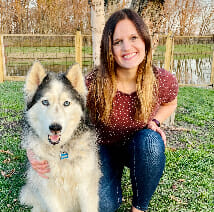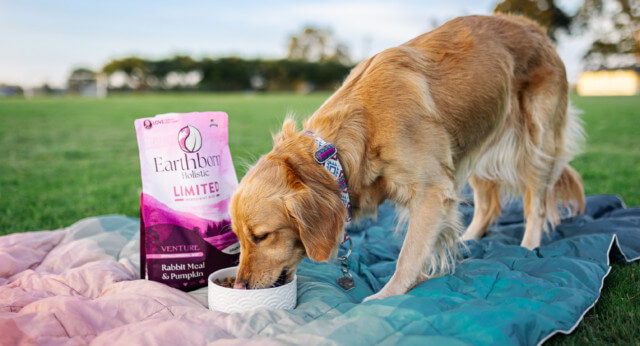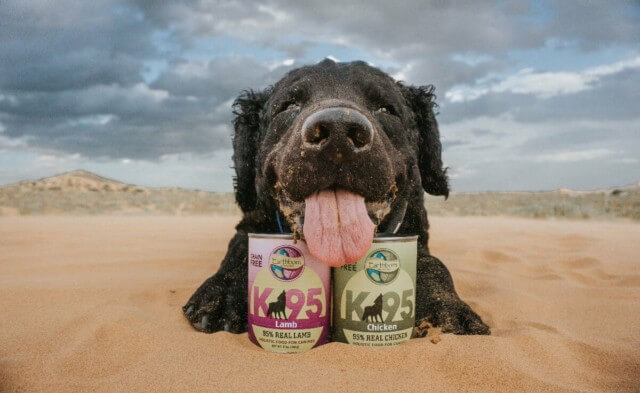What and How Often Should I Feed My Dog?
If you’ve ever asked “how often should I feed my dog?” then you should also learn what to feed your dog! Here are some tips for your dog’s diet you can benefit from.
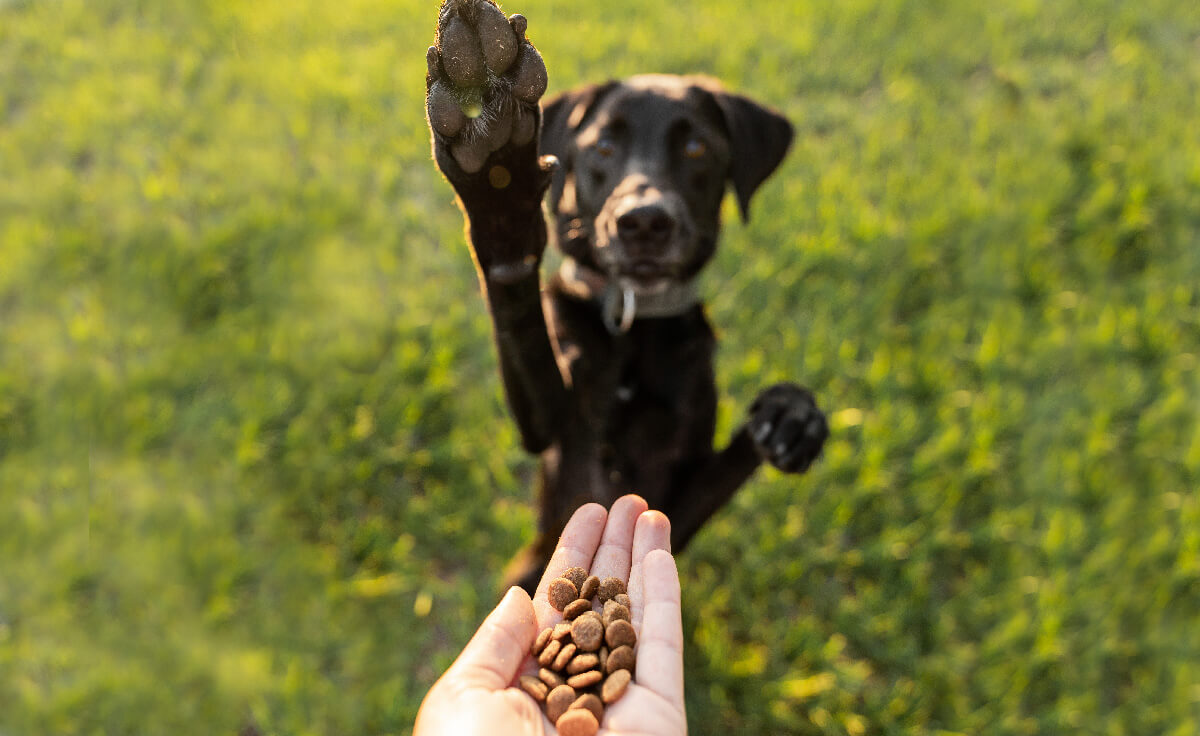
Is Your Dog Unhealthy?
Keeping your dog happy and healthy is every pet parent’s top priority so it’s important to find foods that are healthy for dogs. You may be wondering, “what should I feed my dog?” A healthy diet for dogs consists of high quality proteins mixed with wholesome ingredients that work well for your dog’s breed, life stage, activity level, and individual needs.
For example, puppy and large breed dog diets require a certain amount of calcium and phosphorus levels to help ensure proper bone growth. When looking for good diets for dogs be sure to look for the AAFCO statement on your pet food bag. This will let you know if the recipe has been formulated to be complete and balanced for growth/lactation, adult maintenance, or all life stages.
Does Your Dog Need to Lose Weight?
Figuring out your dog’s ideal weight can be tricky and is something that should be determined with the help of your vet. However, if you suspect that your dog has packed on a few pounds a Body Condition Score Chart can be a great starting point in figuring out if your dog may need to go on a doggie diet.
It’s important to remember that the overeating of food and treats is a common cause for added weight, but weight gain can also be caused by factors such as lifestage, stress, activity level, feeding routine, and underlying medical conditions.
What to feed dogs that are overweight can depend on the reason they are overweight in the first place. If you are overfeeding or giving too many treats, you may be able to reduce the overall amount of food and treats and get your dog back on track.
If your canine diet is already following suggested feeding guidelines, then you may want to choose a recipe like our Weight Control formula which contains a lower fat percentage and a lower amount of calories per cup or increase your dog’s activity level to help burn more calories each day.
The best way to feed dogs will depend on your dog’s individual needs and should be discussed with your vet.
Does Your Dog Need to Gain Weight?
On the opposite side of things, what happens if your dog is too skinny and needs to gain weight? Just as there can be many causes for weight gain there can equally be as many causes for why your dog is underweight, too!
Is your dog picky or no longer interested in their food? Are they getting enough calories each day? Is your dog highly active? Are they sick or stressed out? What to feed your dog is based on lots of factors and that’s why it’s important to discuss your dog’s weight with your veterinarian to determine the cause of concern and then you can find ways to gain healthy weight back!
So, what should dogs eat? A healthy way to gain weight is to feed a high quality dog food recipe and choose to feed it in smaller, more frequent meals. This can help your dog digest their food easier throughout the day.
What type of food should I feed my puppy? Puppies are known to play hard and then snooze hard so it’s important that you are feeding a “growth” or “all life stages” recipe to keep up with their energy and specific nutritional needs. It’s always good to monitor your puppy’s weight gain to make sure they are being fed enough for their growing needs. Once your puppy is around 1 year old, dog food can usually transition over to an adult recipe.
What Food Should You Choose?
The best dog food for your furry friends are dog food diets that have been formulated to be complete and balanced. Nutrition for dogs that includes a healthy mix of high quality proteins along with fats, carbohydrates, vitamins, and minerals is a great place to start.
A good dog diet will have an AAFCO statement on their packaging that shows that the recipe has been formulated to meet the nutritional levels established by the Association of American Feed Control Officials Dog Food Nutrient Profiles.
When choosing a dog food you want to make sure it’s formulated specifically for your dog’s stage of life. In the AAFCO statement it will state the intended lifestage. This is usually either growth, gestation & lactation, adult maintenance, or all life stages.
How to choose a good dog food for large breed puppies depends a lot on the AAFCO statement as well! Some recipes will say that they are for all life stages with the exception of large breed puppies. For example, here is the statement on our Great Plains Feast recipe:
Earthborn Holistic Great Plains Feast is formulated to meet the nutritional levels established by the AAFCO Dog Food Nutrient Profiles for all life stages, except growth of large size dogs (70 lb. or more as an adult).
While this recipe is suitable for all life stages it doesn’t meet the nutritional requirements for large breed puppies. Here’s an example of a suitable recipe for large breed puppies:
Earthborn Holistic Coastal Catch is formulated to meet the nutritional levels established by the AAFCO Dog Food Nutrient Profiles for all life stages including growth of large size dogs (70 lbs. or more as an adult).
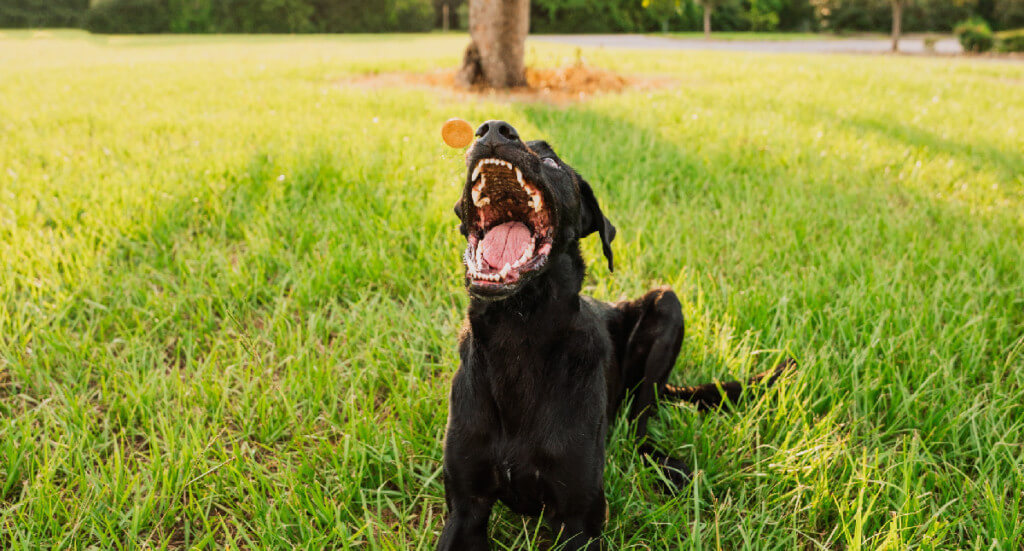
How Much Should You Feed Your Dog?
It’s important to make sure your dog meets their recommended canine calorie requirements and isn’t eating too many calories. The amount of calories per day for dogs will vary according to their weight, age, activity level and health. We recommend using the feeding guidelines on the back of the packaging as a starting point for the calories dogs need, but it’s always good to consult with your veterinarian to take into account your pet’s individual needs.
What should dogs really eat? Pets need a good amount of protein, carbs, and fats but it’s also important that their food is supplying your furry friend with the right amount of dietary fiber. The fiber in a dog’s diet ensures that the food gets broken down at a slower rate. This works to keep your dog full longer to avoid weight gain for dogs as well as keep your dog’s blood sugar stable between meals.
Should You Cook Dog Food at Home?
Your dog is a big part of the family so of course you want what’s best for them. Let’s face it–A home cooked meal definitely sounds and looks more appealing than most commercialized dog food options, but does that make it better?
For a dog or a puppy, homemade dog food can be a great option for some pet parents if time and money allows. If you are also looking for a new dog food due to a food allergy, your vet may suggest an elimination diet. Cooking your dog’s food may be a necessity since it is suggested to feed only one protein source and one carbohydrate source during this time.
The biggest drawback to a home cooked diet is that not everyone realizes that the nutritional needs of dogs differ from the needs of humans. According to AKC.org, “When you don’t prepare balanced meals that are individualized to your pet’s needs, it can come at a cost. Nutrition deficiency (or excess) can lead to diseases, such as malnutrition or obesity, and can ultimately be fatal.”
Another potential issue is the inclusion of ingredients in a home-cooked meal that are considered toxic to dogs like chocolate, onions, garlic, avocado, or chocolate.
If you want to provide homemade food for puppies or adult dogs, then it’s important to discuss possible recipes with an animal nutritionist or utilize a site like BalanceIT.com to help formulate balanced home cooked dog food recipes that have all of the necessary nutrients your dog needs to thrive.
If cooking dog food at home doesn’t work for you, rest assured that our Earthborn Holistic recipes are formulated by a team of veterinary nutrition professionals dedicated to developing and formulating complete and balanced diets to meet the nutritional needs of your pet.
What Meat Should Your Dog Eat?
Meat is a great source of protein for your dogs, but how do you decide which meat your dog should eat?
One of the most common sources of protein is chicken, but is chicken good for dogs? The answer really depends on your dog. In general, chicken is a wonderful protein source since it’s lean and easily digestible. However, if your dog has a confirmed chicken allergy then you’ll have to find an alternative protein source for your four-legged friend.
Is grilled chicken good for dogs? This answer also depends on how the chicken is prepared. With grilled chicken you have to be careful with any added seasonings as one of them such as onion or garlic could potentially be toxic to dogs. Unseasoned grilled chicken with the bones removed is a great option for a meat source.
Let’s move to the controversial topic of raw food. Can dogs have raw steak? What about raw beef for dogs? Is it safe to give dogs raw meat in general? According to the AKC.org, “The American Veterinary Medical Association opposes the unregulated feeding of raw foods and discourages “the feeding to cats and dogs of any animal-source protein that has not first been subjected to a process to eliminate pathogens, because of the risk of illness to cats and dogs, as well as humans.”
With that being said, you will find people who swear by a raw pet food diet. Dogs can thrive on eating raw diets, home-cooked meals, and conventional kibble diets so it’s a great idea to discuss your dog’s individual needs with your vet or an animal nutritionist.
What Fruit Should Your Dog Eat?
An apple a day keeps the doctor away, but can dogs have apples? Can dogs have fruit in general? The answer is yes! Fruit is not an essential part of a dog’s diet but they can be a fun snack or a great supplement to your dog’s daily meal.
Some fruits can be toxic, but here’s a list of safe fruits for dogs to eat:
- Apples
- Bananas
- Blueberries
- Cantaloupe
- Cranberries
- Cucumbers
- Mango (remove pit)
- Oranges (peel oranges)
- Peaches (remove pit)
- Pears
- Pineapple
- Raspberries
- Strawberries
- Watermelon
- Pumpkin
With any food, too much can be a bad thing so it’s important to feed these fruits in moderation. If you are looking for a new dog food with fruits, the majority of our dry food and treats contain a healthy mixture of fruits such as apples, blueberries, and cranberries.
Pumpkin is also another amazing fruit to add to your dog’s diet. Pumpkin for diarrhea in dogs is a great way to help bulk up your pet’s stool due to the pumpkin’s high soluble fiber content. The best way to feed dogs pumpkin is by utilizing a dry dog food or treat that already contains pumpkin or by purchasing canned pumpkin with zero additives as a quick and easy way to add more digestive support to your dog’s diet.
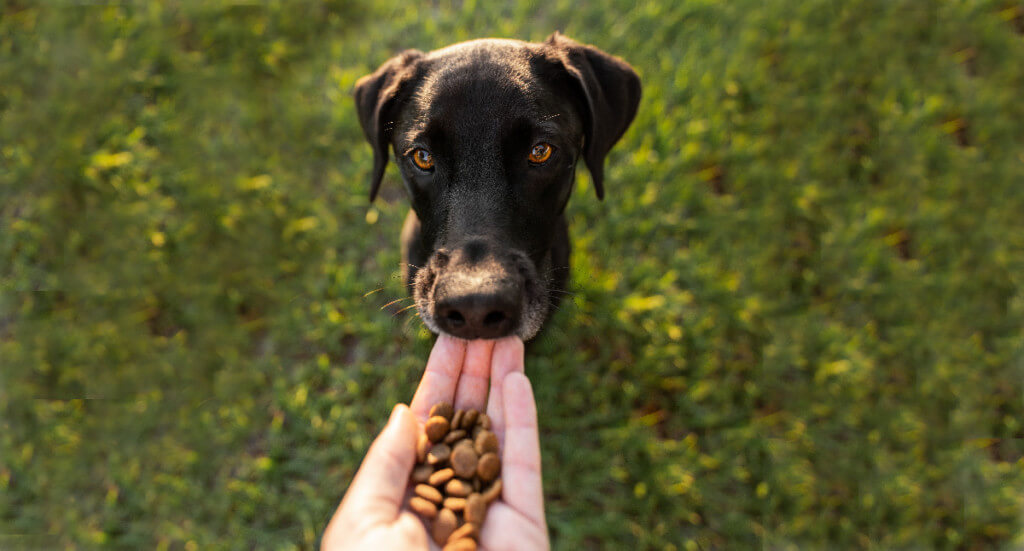
What Vegetables Should Your Dog Eat?
We are always told to eat our vegetables to stay healthy so it’s no surprise that vegetables can be what to give a dog to help them stay healthy, too!
Healthy veggies for dogs include:
- Broccoli
- Brussels Sprouts
- Cauliflower
- Carrots
- Celery
- Cucumbers
- Green Beans
- Peas
- Sweet Potatoes
- Zucchini
Even though there are a lot of veggies dogs can eat, it’s important to feed these good veggies for dogs in moderation and remember to not prepare them with special seasonings like onions and garlic. These additives can make veggies extra tasty for humans, but can unfortunately be toxic for our canine friends.
What Nutrients Does Your Dog Need?
In order for your dog to thrive and have the best nutrients, it’s important your dog’s diet includes these six types of nutrients:
- Water
- Proteins
- Fats
- Carbohydrates
- Minerals
- Vitamins
These nutrients are necessary for your dog to stay healthy, but they also need to be properly combined to offer complete & balanced nutrition for your dog. For example, having too much protein will go unused by your dog’s body and can be hard on their kidneys, but having too little can cause an imbalance and put your dog at risk for health disorders like diabetes.
As mentioned earlier, the best dog food for weight loss or a good diet food for dogs is one that offers a good amount of dietary fiber as it helps with digestion and can keep your dog feeling fuller for longer.
What Time Should Your Dog Eat?
“How many times a day should you feed a dog” and “What times should I feed my dog?” are both very common questions.
For dogs, healthy diets should be eaten at least twice a day, in the morning and evening, to help keep their metabolism stable throughout the day. Depending on your dog’s individual requirements, they may need to be fed more often.
When feeding dogs that need to eat more than twice per day, you may need to structure when pets have lunch around your working schedule, use a reliable smart feeder, or take your dog to doggie daycare to ensure their feeding needs.
It’s also important to realize that a small dog feeding schedule will most likely differ from a larger dog’s feeding schedule. This is due to the different weights and the amount of food you will need to feed your larger dog because of their calorie needs.
How Often Should Your Dog Eat?
“How often do dogs eat?”, “How many meals a day for dogs? and “When should dogs be fed?” are all very common questions for new pet parents. The healthiest way to feed your dog is to create a dog food schedule. Setting a food routine is a good idea because dogs are creatures of habit and tend to thrive on routines.
Feeding guidelines on the back of your pet food packaging can provide a great starting point on the amount of food you should feed your dog each day. Please remember that this amount can always vary due to body condition, age, activity level, and environment and can be discussed with your vet if you still have questions.
The guidelines on our products show the total amount of food for the day, but that amount should be broken down into two or three smaller meals throughout the day depending on what works best for you and your dog.
It’s still important to note that there’s not a one-size-fits-all approach. When feeding my dog I actually offer him food throughout the day as he likes to “graze”. I don’t think this option is widely considered to be the best, but it does work well for my dog as he is 11 years old, healthy, and remains at a good weight!
How to Keep Your Dog Healthy
What is the best healthy weight dog food? What do puppies like to eat? Do dogs have to eat dog food? Should dogs only eat dry food? As pet parents we ask so many questions because we care about our furry friends and are always on the lookout for the best options to keep them healthy and happy for their entire lives.
Keeping your dog healthy depends on a few different factors. Finding the right food for your dog’s individual needs, having a good exercise routine in place, and providing your pet with lots of love, attention, and mental stimulation are all important pieces in maintaining your dog’s health.
